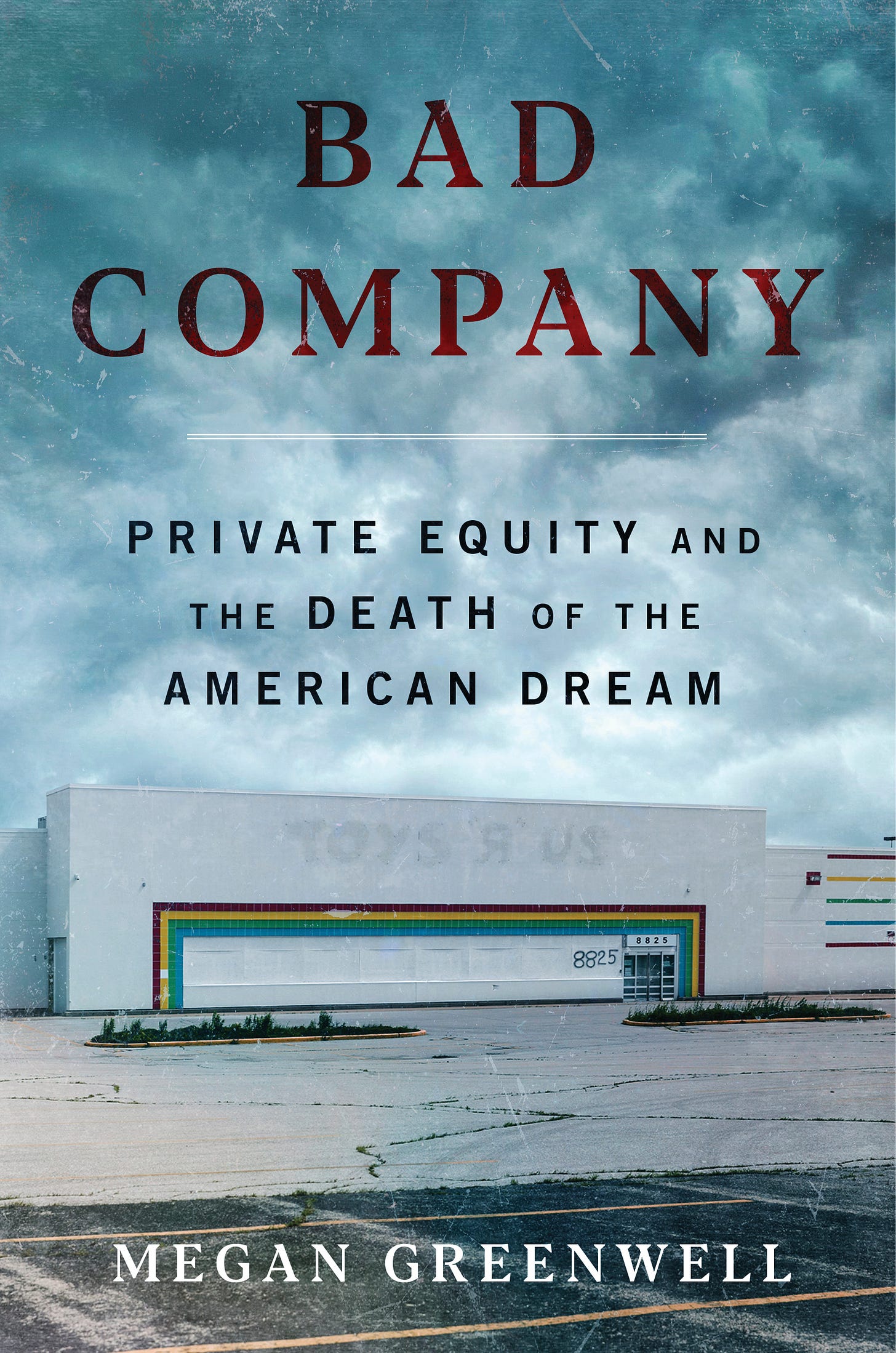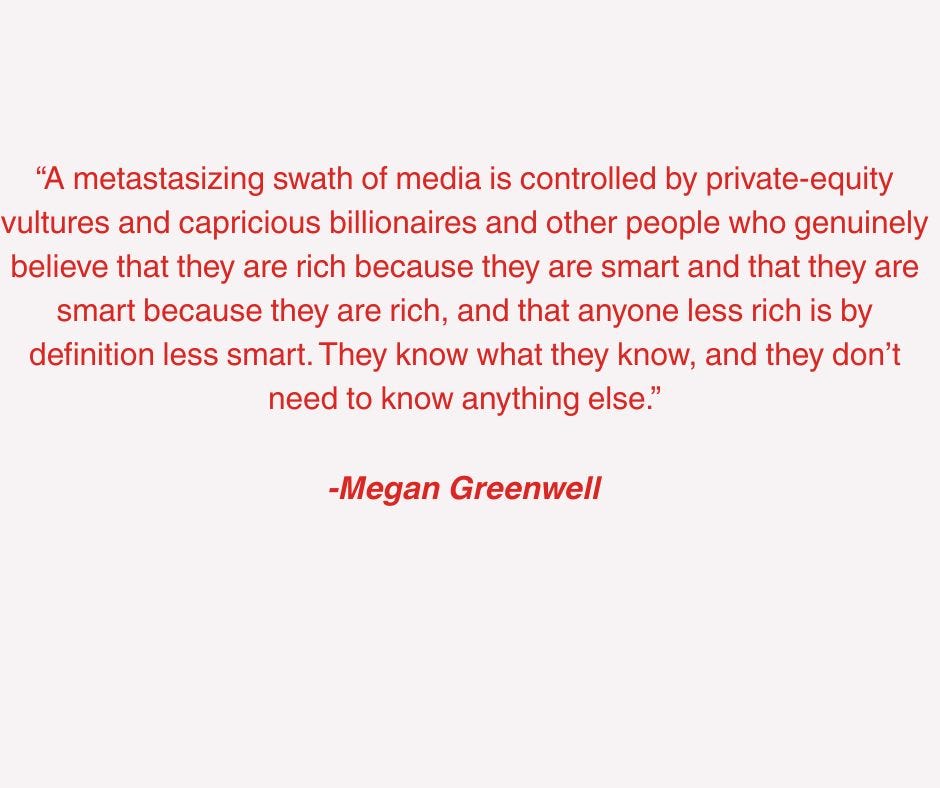Megan Greenwell had her career blown up by private equity. Greenwell is a journalist and editor; in 2019, she was editor-in-chief at Deadspin, a sports blog with a cultlike fandom. That year, Deadspin was acquired by the private equity firm Great Hill Partners. At first, she didn’t have strong feelings about the sale. When you live in and work in the media, you become accustomed to the jerky carnival ride of new owners, layoffs, closings, cutbacks, new promises of innovation, new outlets, more layoffs, and on and on. But with Great Hill it was a little different. The site’s new owners didn’t seem to understand the company, what made it successful, or even how journalism worked. Greenwell watched from the inside as Deadspin was systematically dismantled.
An essay that Greenwell wrote and posted to Deadspin the day she quit immediately went viral. The essay, “Adults in the Room,” is a searing indictment not just of the owners of Deadspin, but of the jackal-like American system of capitalism. She noted, “A metastasizing swath of media is controlled by private-equity vultures and capricious billionaires and other people who genuinely believe that they are rich because they are smart and that they are smart because they are rich, and that anyone less rich is by definition less smart.”
Greenwell’s thesis was that the men taking over her company, who were promising to do business better, were actually doing it worse. Their decisions made no sense. They were cutting back on the kinds of writing that were getting clicks and readership. They were attacking the very people and work that gave their company value. And they were doing it while claiming to be the best in the business.
Six years later, this observation could be made about every industry and political system in America, where people trust rich people because they are rich. Not because the rich are any good at business, but because in America, wealth is seen as an indication of worthiness. And wealth for its own sake becomes the goal — crushing creativity, ingenuity, our towns, our families, our democracy, and our lives.
It’s a real “stop hitting yourself” cycle. Companies set up for failure eventually fail; private equity profits.
After her Deadspin experience, Greenwell decided to investigate the broader impacts of private equity. Her book Bad Company: Private Equity and the Death of the American Dream follows four Americans in four different industries. Greenwell shows how private equity is disemboweling our country — acquiring stores, companies, hospitals, housing units, hotels, strip-mining them for profit, then closing them down. The method devastates communities and families. It’s also a really dumb way to make money.
So often in America, the brutality of wealth is hidden by corporate lingo; its impacts are called “the cost of doing business.” But this book shows exactly who and what is at stake. When a Toys R Us closes, it’s not just another big-box store; it’s jobs, it’s the sponsor of the Little League team, it’s a mother putting her partner back through school and supporting her family. By focusing on the human impact, Greenwell shows the real costs.
And there is hope. The book also shows how people who get creative can keep their businesses open, benefit their communities, and create jobs. Greenwell offers us a more humane way to think about wealth.
We spoke about her book, the media, and how we solve the problem of wealth in an increasingly stratified country.
Lyz Lenz: Why did you decide to write a book about private equity?
Megan Greenwell: The promise of private equity is that it can take failing businesses and turn them around. The industry talks about itself like the people in it are superheroes, swooping in to save distressed assets. And it is true that they target a lot of industries where there are pretty serious challenges.
One of the industries I write about in the book is local newspapers. Their problems were not created by the private equity industry. There were so many catastrophic business decisions long before private equity entered the picture, so the promise makes sense on a lot of levels. The flip side of that promise is that they're also promising money for pensioners. A lot of the money that's invested in private equity funds comes from public pension programs.
So the promise is on one hand, we're saving these companies, and on the other hand, we’re the caretakers of public pension money so all these retired nurses and firefighters and teachers are going to be able to retire and support themselves based off this money that they've earned from our funds.
Turning bad companies into good companies, great, wonderful. Who doesn't want that? Helping public employees retire. Great, wonderful. Who doesn't want that?
The devil, as with so many things, is in the details — but that is why I think a lot of people are attracted to what private equity says it's doing.
LL: What were some of the things that have stuck with you the most that you discovered while you were researching?
MG: I knew private equity was really powerful politically and in society at large. I didn't realize until I crunched the numbers that 88% of representatives and senators on Capitol Hill take money from private equity — that's across parties. And so the extent to which these folks are really on the dole is pretty striking. People often ask me, why isn't there more of an appetite to do something about this system? And that's the answer. Nobody on Capitol Hill has an incentive to do something about this system.
LL: It feels complicated because yes, maybe private equity can keep a newspaper open, but at what cost?
MG: A thing that people don't really understand is when newspapers started struggling, many of them were still making 20% profit margins.
Now, those were significantly lower than they had been in the past. So people were absolutely correct that there was a downward trend, but the idea that in 2008, 2010, newspapers were on their deathbed is just not supported by the facts.
What private equity firms did is they sort of capitalized on that panic. And they said, great, we will save them. But what saving them meant was stripping them for parts, making a lot of money for the private equity firms and leaving the newspapers without much, if any, local coverage.
Not only do they not save the day, but they're not even taking on any risk because of the way the system is structured.
You end up with this division of incentives where the private equity firm is supposed to be working on behalf of the company they've acquired, but the incentives are split in such a way that they can make theirs regardless of whether the company lives or dies.
LL: Could you talk a little bit about that human toll?
MG: It is really so devastating to workers, to communities, to tenants, to patients, all of that. I think Toys R Us is the story that carries the least moral outrage in the book because fundamentally it is retail. But like you say, Toys R Us was an institution in many, many, many communities. It was a place that multiple generations would go to buy toys. The Toys R Us would sponsor the little league team in town.
Obviously the private equity firm that is based hundreds or thousands of miles away has no interest in sponsoring the Little League team. In many cases, they’ve never even been to that community. This is literally just one of a thousand widgets they're overseeing.
The woman I wrote about in the Toys R Us section was supporting a family of five because her husband was in school. I think we have this stereotype of people who work jobs like retail, that they are replaceable cogs in a machine and that they're just taking whatever job they can get. Here, the opposite was true. This woman had picked out Toys R Us as the single best option to support her family. She was an incredibly dedicated, high-performing worker. She made many of her best friends working there. She got a Toys R Us tattoo with a bunch of her colleagues.
Because the company went under, not only was she laid off, she was told she wasn't going to get the severance that was promised in her contract. All of a sudden you have a family of five who is at serious risk of homelessness because she is the sole provider for this family.
LL: I also was struck by the way private equity works in housing.
MG: I knew from the beginning that private equity was in housing, but a couple of years ago, most of the talk about private equity in housing was about mobile homes.
I write about this apartment complex in Northern Virginia. It's five buildings. It's over 2000 units, and it's a lot of African immigrants and refugees living there, and it's just a massive, massive space.
They have their own bus depot for public buses because it's just so many people. And that complex got bought by a private equity firm, and all of a sudden, this is affecting the entire community because it's just so many people. And so a stunning percentage of all the eviction proceedings going on in the city of Alexandria, outside DC, where this apartment complex is, were from this one complex. Now all of a sudden, you have massive political problems because all sorts of government resources are getting swallowed up just by this one company's desire to evict a lot of people. And you have thousands of many of the most vulnerable people in your community who are now facing potentially living on the street.
The extent to which private equity has its tentacles in housing, every sector of housing cannot be overstated, nor can the effect on some of the most vulnerable people in our society.
LL: And the reality of it all is they don't profit off our success. They profit off our individual misery.
MG: How could a private equity company possibly make money if they're not serving customers? And the answer is essentially over the last several decades, we've turned into an economy where you make money not by making things or providing services, but by making money. It’s called financialization: Basically you make money through tax maneuvers and bonuses and savvy investments, and you do that not only if you're a bank; you also do that if you are a landlord, a hospital company, whatever it is. And that's what made me so obsessed with this system: they have their ways of making money regardless of what the companies that they own are up to, how they're performing. And I would argue that that's not a symptom of a healthy economic system.
LL: There is a real question of, what do we owe people, and how should we talk about what we owe people?
MG: Private equity firms are correct that it is very difficult to make money off a rural hospital. That's absolutely true. And also, okay, so does that mean rural communities just don't get hospitals?
One of the most surprising parts of reporting this entire book was when I was talking to this guy who works as the managing partner at this consulting firm that is the preeminent consulting firm for rural hospitals. When they're in trouble, they call him. He doesn't tell them to strip all their services. He tells them, in most cases, to provide more services. So maybe a hospital can't make money off the maternity ward. But they can offer specialized procedures. Then they’re underwriting the maternity ward.
There is an interesting story from Oskaloosa, Iowa, not too far from you. This hospital, Mahaska Health, that's run by a former Dallas Cowboys linebacker, Kevin DeRonde — when all of the hospitals in their area started laying people off because they were panicked about the effects of covid, DeRonde did exactly the opposite. He scooped up all the people who were getting laid off elsewhere so they wouldn't leave the community. And what ended up happening is he went from running a struggling hospital to now a solidly profitable hospital.
That is something that a private equity firm would never do. It is so contrary to the fundamental business model. But in this case, and in many other cases, it resulted in actually making more money. So yeah, I think that's one point I've really been trying to hit: You don't have to be Karl Marx to think this system is broken, right? You can want hospitals to make money and also realize that this is not the way to do it.
LL: There's a conventional wisdom that if something doesn't make money, then you just stop doing it. But when you do that, you quash creativity.
MG: And I think what has happened with private equity companies is the company then does not have the wiggle room to be creative in terms of finding new solutions. So if we take the media example, where does the New York Times make its money to underwrite investigative reporting? Games and cooking. This is just a fact of the industry.
LL: After investing so much time and seeing this bleak capitalist landscape, what's the hope that you're holding on to?
MG: A lot of the work has to be in reinventing these industries, because private equity did not create the problems in any of these industries. They profited from those problems, but they didn't create them themselves.
And so that means that people are going to have to do the work of building a healthier industry in whatever. To use the media example, there's all sorts of interesting work that's being done on this front. So there are worker-owned cooperatives. There are interesting explorations of what public funding of media that doesn't violate the First Amendment could look like. There are this wave of nonprofit, local startups, many of them funded by the American Journalism Project, that are at this point routinely winning Pulitzers, breaking big stories and becoming financially sustainable.
You need a lot of people to do a lot of hard, slow work for that to pay off. But my argument is the hard, slow work is the only thing you can choose between becoming part of a fight or just rolling over and playing dead. And I know what I would choose, and I hope many other people choose that path too.
See Lyz in NYC tonight!
👋 Hi friends! Tickets are still available for the Red State Rager to support abortion access in Iowa! I hope to see you there.
📅 When: Wednesday, June 11 · 7-9 pm EDT.
🍸 Where: 4 Berry Street, Brooklyn, NY 11211
🎟️ How do I buy tickets? Through this Eventbrite link!







This mindset is happening in the public sector too! I quit teaching in public education after 17 years because the school board and superintendent of my small town had exactly that attitude - we are richer than teachers so we are smarter than teachers. Rather than thinking about how best to serve our community, they were so obsessed with saving money and not listening to teachers that our once amazing school system rapidly tumbled to the bottom. It is very hard for people without $ to serve on school boards because it is a lot of time for meetings, etc which is unpaid. So the wealthier folks show up with crackpot ideas about saving money but that is absolutely not why school districts exist! (Every year they made massive financial mistakes and hid money from us!)
Excellent. Thanks.
Since the late 1970s and early 1980s, the notion of looking after the interests of shareholders took precedence over the interests of stakeholders (employees, the communities being served, etc.). As a consequence, company managers were given stock shares to help align their interests with that of most shareholders, Reagan cut the highest marginal tax rates from 70% to 50% (and then 28%) and inequality surged.
Sounds like the same for private equity as for public corporations. Making money became the be-all and end-all, and the losers were the people who had a "stake" in business, but not so much in the financial side of things.
Time for more employee ownership.